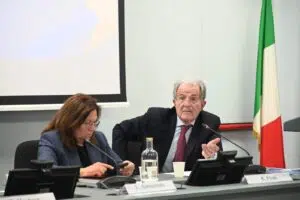Brussels – Without the unity of purpose of France and Germany, the European Union cannot function. Still, a European model too much based on Franco-German demands risks leading nowhere except to the margins of an increasingly competitive world. The message coming from the debate on “The European Union in the Time of the New Cold War” is that of a reform of the twelve-star architecture, to overcome a structure that is too confederal and too little federal.
“The next European elections will not only be a vote on the kind of transition we want, but they will also first and foremost be a vote on our strategic autonomy,” stresses Carlo Corazza, head of the European Parliament office in Italy, host of the Spazio Europa “David Sassoli” in Rome, the setting for the debate. “The European Parliament is calling for a more federal Europe, a reform of the treaties with qualified majority voting on all matters, making the NextGenerationEU permanent”.
A conviction of a political-institutional reform that is also shared by Antonio Parenti, head of the European Commission representation in Italy: “Federalism is the hypothesis we must consider” at this historical moment.
Reasons and explanations are many and varied, and the task of addressing them is left to Marco Buti, professor at the European University Institute and former Head of the Commission’s Directorate General for Economic Affairs (DG ECFIN) and head of the cabinet of the Commissioner for the Economy, Paolo Gentiloni, Buti criticises the German economic model, and in particular, Germany’s constant financial surplus. “It is an element of weakness,” he cuts short. “Savings are produced; there is no room for investment.” Moreover, he continues, “constantly subtracting demand does not contribute to global growth”. The invitation to spend#is not new and has already been the reason for calls from the Juncker Commission and the von der Leyen Commission. Domestic consumption could and should be stimulated, especially in a context in which “we have foreign-driven growth”, recalls Buti, who is convinced that “the European business model is not sustainable in the medium term” because it is too closely aligned to a German reality and its dysfunctions.
Marta Dassù, advisor to the Aspen Institute and former deputy foreign minister and undersecretary of foreign affairs for the Italian government, also thinks so. “The German model was based on cheap Russian gas purchases and sales to China, secure in the protection of the United States,” Dassù criticises. “Now this model has failed”, and everyone, at the eurozone and EU level, has to deal with it.
Romano Prodi, who has experienced the European Union as Prime Minister and President of the EU Commission, chastises France instead. “Do we really want to think of making a European army when one country alone has the atomic bomb and the right of veto” in the UN Security Council? A deliberately polemical question, to relaunch the path that is needed to free a European Union that is too entangled in Franco-German logic. “The battle must be the end of the right of veto,” Prodi continued. Above all, in everything that concerns foreign policy and defence. Because it is not so much a question of allies or adversaries. “We have to understand what we want regardless of what Biden or Trump say,” he stresses in reference to US presidential elections laden with unknowns and concerns about possible implications for bilateral relations, which should be dictated by a twelve-star autonomy that is not there, as the Republican candidate’s releases on NATO and defence show.

“Trump is not telling us to spend better” on defence, Romano Prodi points out. Faced with a Europe with different types of tanks, 27 different major states, and a less developed and even less integrated industry, “Trump is interested in a fragmented Europe”. The Franco-German model of Europe cannot help. What is needed is for Franco-German thrusts to lead towards a more European Europe. “We can take our destiny into our own hands,” of this Prodi is sure. But only if we make the change of pace that is needed. “Until today, we have marginalised ourselves by not taking decisions. We stayed out of Iraq, Libya… In Ukraine, we went because others dragged us along.” We need a different Europe with a truly common foreign policy and defence. Otherwise, its geopolitical weight will always be marginal: “I see Europe good at dictating the menu, but then the United States and China sit at the table.” Romano Prodi could not have been clearer than that.
English version by the Translation Service of Withub




